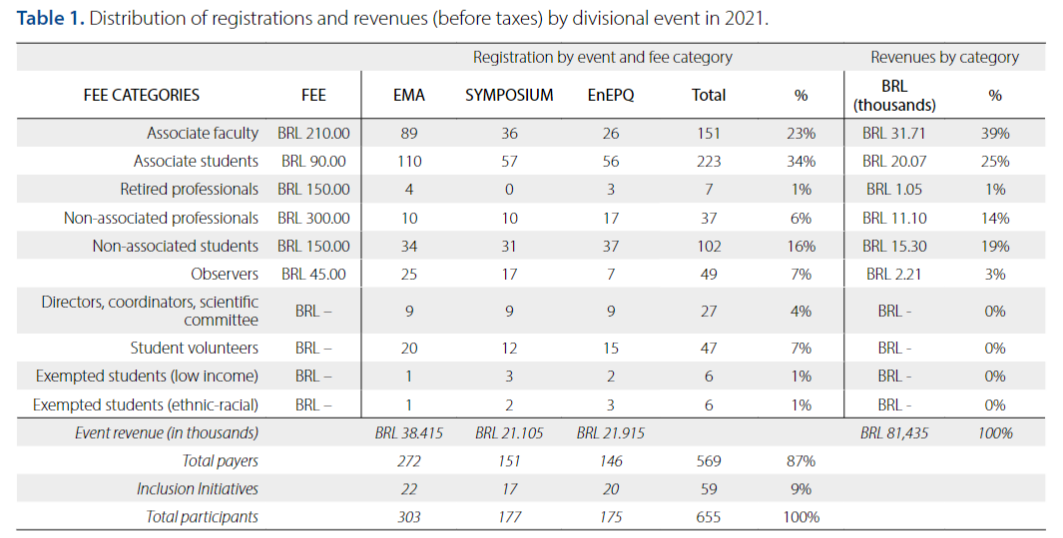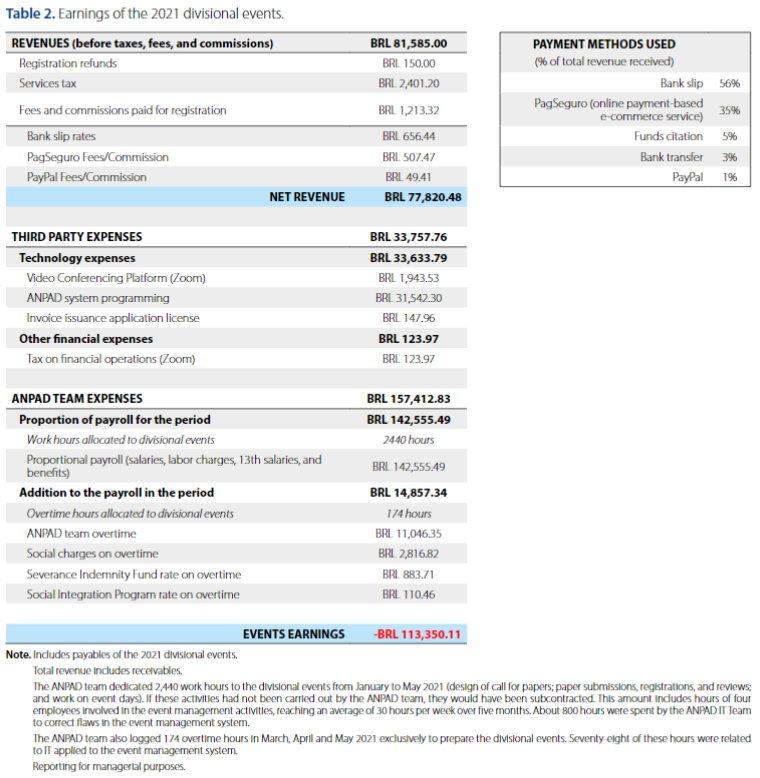Academic events are the main space for integrating the academic community and an important source of financial sustainability for ANPAD. The pricing policy for the 2021-2023 ANPA events was one of the first decisions of the current Board of Directors aiming at providing predictability to our members. We will introduce it in some of the upcoming editions of the ANPAD Newsletter.
New challenges have ensued, and will ensue, as we follow the emergence of new ways of holding scientific events. ANPAD adopted the online format for the first time in the EnANPAD 2020. This year, we have already organized three online divisional events, and we will soon have EnANPAD 2021.
EnANPAD 2021 will take place over eight days, including the professional events that precede the major event’s week. This distribution over a larger number of days aims to reduce the “online fatigue” caused by long, consecutive hours of connection.
The event has also become more dynamic and incorporated a richer content. We have learned that it is possible to maintain quality in online events through investments and mobilization of both the national and the international communities.
In the Board of Directors we have also reflected on the challenge of expanding inclusion programs, with exemptions and discounts for students, while maintaining the financial sustainability of both the events and the Association itself.
The events are supposed to be an arena of interaction and debate for established scholars, but they also should include researchers to-be (Master and PhD students above all) and expand and strengthen the ANPAD community. As an association of graduate programs, we understand that it is essential that events encourage community renewal by both attracting students and faculty from the most diverse locations and retaining the experience of retired professionals.
Based on this premise, we have launched a pricing policy for 2021 to 2023, already applied in divisional events and in EnANPAD 2021, in a scenario of scarce funding for attendance to events. This pricing policy provides for the inclusion of students – both the most numerous category in terms of attendants and the most affected by cuts in public and private resources.
This policy is aimed to establish categories of exemptions and discounts, as well as to institutionalize a volunteer program for students to attend the events for free while taking part in the association’s most diverse activities. To see the policy, please click on here.
Exemptions: Our event exemptions reflect our affirmative policies for racial inclusion and inclusion of low-income students; it also comprises our volunteer program. In the three divisional events held this year, we had a total of 59 students who benefited from this policy, representing 9% of the total number of registrations.
Discounts: Student registration fee is 50% of the faculty registration fee. Retirees also pay a lower fee, as they no longer have their employer’s monthly remuneration or support to attend the events. By doing so, we seek to cherish their historical contribution to the field.
Member discounts: Individual members or those linked to a full-member graduate program pay a discounted feel The full registration fee (or ‘base fee’) can be avoided by everyone that joins the Association We know that the membership is not reimbursed by employers or funding agencies; therefore, we have maintained last year’s membership fee.
Also, we have created the `observer’ category, which allows the attendance of those with few resources or who wish to follow part of the event.
Next, we reflect on the financial result of our divisional events and how our event pricing policy has been applied.
Earnings of the 2021 Divisional Events: Aiming at greater transparency, we present the financial results of our divisional events. This provides a clearer notion of how ANPAD has organized its activities and sheds light on the Association’s sustainability.
Approximately 650 participants attended the three divisional events held last May. Over 330 papers were presented. Table 1 shows registrations in the various categories, the registration fees applied, and the revenue per event.
Most participants benefited from some kind of discount or exemption. Only 6% of faculty and 16% of students did not join the Association to benefit from discounts. This is a point that can be improved through better communication.
Surprisingly, 9% of participants benefited from our exemption policy right after the first application of our inclusion policy, even without much publicity. The divisional events had 49 observers (7% of participants).
Payment by bank slip is still the most used method, followed by credit card. This points to innovations that could be made in payment methods.

Revenue can be identified by event. However, only a smaller portion of expenses is directly ascribable to one of the three events. Thus, the financial result is presented jointly.
Net revenue was BRL 78,400, while total expenses necessary to execute the divisional events amounted to BRL 157,000. Below are some details.
Table 2 shows the various expense items. The most significant third-party expense item consists of programming hours for ANPAD’s event management system, which only covers the stages of paper submission and review, but amounts to BRL 31,500. Yet, the largest expenses of the divisional events are related to ANPAD team hours.
Undoubtedly, our improved event management system will also benefit future events. Nonetheless, 2,440 ANPAD team hours were dedicated solely to organizing the divisional events from January to May 2021, in addition to 174 overtime hours paid exclusively for these activities. Part of these hours (see notes in Table 2) was also applied to programming and adjusting the event management system. The ANPAD team is currently overwhelmed with work, and overtime pay has been recurrently used to mitigate periods of intense activity. We are conducting studies to review this situation.
The amount paid for Zoom platform licenses had no significant impact (BRL 1,900) on the events’ budget. This rather amateur way of managing virtual rooms and access links was only possible because of the low number of simultaneous participants, from 150 to 300.
However, this operational model is not applicable for events as large as EnANPAD. In this case, a more robust platform is required to support the simultaneous access of thousands of participants distributed in more than 30 rooms and in keynote sessions over the eight days of event.
But why to consider ANPAD team hours in the result? Because these hours have been consumed by the events and entail overtime hours or new hires for the ANPAD Proficiency Test and other actions of the Association.
When we disclose the result of the ANPAD Proficiency Test, we will also include ANPAD team expenses allocated to this activity. We will do the same for EnANPAD. With the disclosure of ANPAD’s 2021 budget in the next Newsletters, you will be able to have a clearer notion of the Association in the long term and we will invite you to reflect with us on the sustainability of our pricing policies.

Published by at 11/21/2022 at 09:06 PM